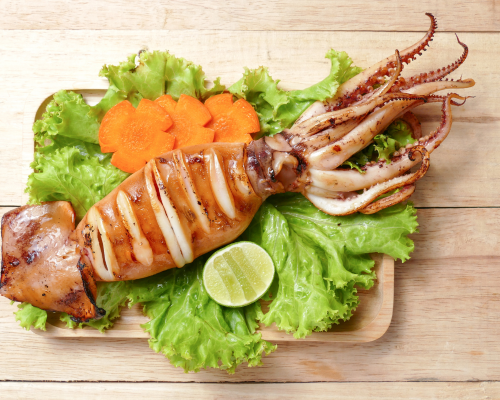Can Dogs Eat Squid? Is It Safe?
Can Dogs Eat Squid? Is It Safe?

Vet Reviewed

By: Sarah Hodgson
April 29, 2023
- Posted in DogsCan Dogs Eat
Table of Contents
When it comes to seafood some of us like it, others hate it. If you're taking a bite out of calamari or better known as squid and your dog is staring at you with their large cute eyes. You might be wondering whether you can feed your dog squid.
In this article, we will dive into whether dogs can eat squid. The health benefits, potential risks, and how to properly prepare squid for your dog.
Let's dive in!
Squid Nutritional Facts
Before we jump into whether it's safe for dogs, let's go over the nutritional facts found in squid.
Squid is a low-calorie food that is rich in essential nutrients. It is an excellent source of protein, which is essential for building and repairing tissues in dogs. Protein also helps dogs maintain a healthy immune system and supports the growth and development of puppies.
Here's the nutritional facts for raw squid (per 100 grams):
- Calories: 92
- Protein: 18 grams
- Total Fat: 1.2 grams
- Cholesterol: 233 mg
- Sodium: 44 mg
- Potassium: 360 mg
- Total Carbohydrates: 2.2 grams
- Dietary Fiber: 0 grams
- Sugars: 0 grams
Which Vitamins are in Squid?
Squid is a nutrient powerhouse, containing various vitamins that can benefit your dog's health.
Here are some of the various vitamins and minerals found in raw squid (per 100 grams):
- Vitamin A: 2 IU
- Vitamin C: 3.5 mg
- Vitamin B12: 3.1 mcg
- Vitamin E: 1.9 mg
- Calcium: 44 mg
- Iron: 1.2 mg
- Magnesium: 58 mg
- Phosphorus: 196 mg
- Zinc: 1 mg
- Selenium: 48.5 mcg
Squid is also a good source of selenium and zinc. Selenium is an essential mineral that acts as an antioxidant and supports a healthy immune system. Zinc, on the other hand, is important for the production of enzymes and proteins, and it aids in wound healing and maintaining a healthy coat.

Can Dogs Eat Squid?
So squid does have some nutritional benefits to dogs as we learned earlier. However, is it safe?
Yes, dogs can eat squid as a treat every once in a while. Too much of it might cause adverse health effects. Occasionally feeding squid to your dog is just fine and provides health benefits if done in moderation.
Note
Some dogs may have allergies or sensitivities to seafood, including squid. If your dog has a history of food allergies or sensitivities, consult with your veterinarian before introducing squid into their diet.
Health Benefits of Squid for Dogs
This might come as a surprise but squid is a nutritious food option for dogs. Especially when offered as a treat every once in a while (In moderation). It offers a range of vitamins, minerals, and other nutrients which include:
- Rich in Protein: Squid is a good source of high-quality protein, which is essential for muscle development, maintenance, and overall body function in dogs.
- Low Fat - Squid is a low-fat food, making it an ideal choice for dogs that need to maintain a healthy weight and for a great snack. It is also low in cholesterol and high in protein, contributing to overall health.
- Omega-3 Fatty Acids: Squid contains omega-3 fatty acids, such as DHA and EPA, which contribute to skin and coat health. These fatty acids also have anti-inflammatory properties and may support joint health in dogs.
- Nutrient Variety: Squid provides essential nutrients like vitamins (e.g., B12) and minerals (e.g., selenium, zinc), contributing to your dog's overall nutritional needs.
- Low in Fat: Squid is relatively low in fat, making it a suitable protein source for dogs that need a leaner diet or are prone to obesity.
- Easily Digestible: Squid is generally easy for dogs to digest, making it a suitable option for dogs with sensitive stomachs or food allergies.
- Taurine Content: Taurine is an amino acid important for heart health in dogs. While not as rich in taurine as some other meats, squid does contain small amounts, contributing to a balanced diet.
Can Dogs Eat Raw Squid?
Unlike cooked or boiled squid, you should never feed your dog raw squid. Most dogs will not be able to tolerate it well. It can cause vomiting, diarrhea, and possibly worse health problems. Raw squid contains bacteria that can cause a dog to get sick. So it's best to avoid feeding your dog raw squid.
Can Dogs Eat Squid Tentacles and Heads?
While squid tentacles are generally safe for dogs to eat, the heads should be removed during the cleaning process and should not be fed to dogs.
The head and innards of the squid are not considered edible and may pose a risk to your dog's health. Stick to feeding your dog the muscular body and tentacles of the squid, ensuring they are properly cleaned and cooked.
Squid Oil for Dogs
Apart from consuming squid meat, another way dogs can benefit from squid is through squid oil. Squid oil is derived from the blubber of squid and is rich in omega-3 fatty acids. Omega-3 fatty acids are beneficial for dogs in the same way they are beneficial for us humans.
Adding squid oil to your dog's diet can improve their skin and coat health, reduce itching and dryness, and alleviate joint pain caused by conditions such as arthritis. It can also support cognitive function, helping to keep your dog's brain sharp and agile as they age.
Is Squid Ink Safe for Dogs?
Squid ink is a dark, viscous substance found inside the squid's ink sac. While it is a popular ingredient in human cuisine, is it safe for dogs to consume? The answer is, it depends.
Squid ink is generally safe for dogs to eat in small amounts. However, squid ink can stain fabrics, carpets, and furniture, so it is best to feed it to your dog in an area that is easy to clean.
It is worth mentioning that squid ink is primarily used for its unique flavor and color in human dishes, and it does not provide significant nutritional benefits to dogs. Therefore, it is not necessary to include squid ink as a regular part of your dog's diet.

Preparing Squid for Your Dog
When preparing squid for your dog, it is important to cook it properly. You can steam it, boil it or even roast it. Steaming the squid will keep most of the nutrients but the other options are just as fine.
Here are some quick tips for cooking squid for your dog:
- Clean the squid thoroughly, removing the head and innards.
- Boil the squid in clean water without any seasonings, salt, or spices.
- Ensure that the squid is cooked thoroughly before serving it to your dog.
- Avoid giving your dog fried squid or calamari, as the batter and frying process can introduce harmful fattening ingredients.
- Feed it to your dog to enjoy.
The Risks of Feeding Squid to Dogs
Even though feeding your dog squid is generally safe. As with most foods squid poses some risks to dogs. Not all these risks should concern your or your dog and most won't but it's important to keep them in mind when feeding squid to your dog.
- Allergic reactions: As mentioned multiple times, some dogs may be allergic to seafood, including squid. Monitor your dog closely for signs of an allergic reaction after feeding them squid.
- Thiaminase: Depending on the source, squid may contain thiaminase, an enzyme that deactivates thiamin (Vitamin B1). Cooking the squid will destroy thiaminase, reducing the risk of a B1 deficiency in your dog.
- Choking hazard: Ensure that the squid is properly cleaned and cooked before feeding it to your dog. Small bones or improperly prepared squid could pose a choking hazard.
Homemade Squid Dog Treats
The best dog treats are always homemade! Don't you agree? If you would like to make some fun squid treats for your dog, consider trying out the following recipe:
- Clean and cook the squid as previously described.
- Cut the cooked squid into thin slices or chunks.
- Place the squid pieces on a dehydrator rack and dehydrate for 12-24 hours, depending on the size of the pieces.
- Check the consistency of the treats regularly. They should be completely dehydrated and snap easily in half when ready.
- Store the treats in an airtight container and feed them to your dog as a special treat.

The Bottom Line
So there you have it, dogs can safely eat squid. In fact, if done in moderation it is a healthy and nutritious addition to your dog's diet, providing various vitamins, minerals, and other nutrients. However, it is crucial to prepare the squid properly and be aware of any potential allergies or sensitivities your dog may have.
As always, don't just give squid to your dog as a balanced diet is crucial. Happy seafood eating!

Subscribe to Petfluence!
Get updates on the latest posts and more from Petfluence straight to your inbox.